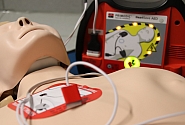
On Thursday, 21 April, the Saeima adopted in the final reading amendments to the Medical Treatment Law, delegating the Cabinet of Ministers to designate the public spaces in which automated external defibrillators are to be set up and to stipulate the requirements for their installation.
An automated external defibrillator is a portable device used for detecting heart rhythm and applying electrical discharge to the heart to restore normal heart rhythm and blood circulation in the case of life‑threatening arrhythmia.
“The legislative amendments will ensure that automated external defibrillators are available in public spaces, which can be crucial for saving human lives. The use of a defibrillator at a critical moment can ensure the restoration of normal heart rhythm and blood circulation until medical professionals arrive,” explained Andris Skride, Chair of the Social and Employment Matters Committee, which is responsible for the progress of the Draft Law in the Saeima.
The Cabinet will lay down the procedures for the operation and technical maintenance of the defibrillators, the content of the training programme that people must undergo before they can operate the defibrillators, the procedures for providing the necessary training and licensing the participants, and the term of licensing.
As explained by the authors of the Draft Law in the explanatory note, in Latvia, automated external defibrillators are already available in the largest retailer chains, the airport, embassies, as well as major companies.
According to the explanatory note, the State Emergency Medical Service of Latvia has developed guidelines for creating a basic first aid training programme that involves the use of automated external defibrillators. In addition, the State Emergency Medical Service is planning to include the operation of defibrillators in the training programme for first aid educators and the basic first aid training programme.
The amendments also stipulate that the Cabinet will have to appoint a controller of the information system for inpatient medical facility resources. This is necessary to ensure prompt exchange of data regarding the resources available at inpatient facilities and also to monitor the health situation and outcomes of inpatients receiving treatment for infectious diseases. In addition, the Cabinet will decide on the data to be included in the information system, the scope of these data, and data processing procedures.
The amendments will enter into effect on 1 January 2024.
Saeima Press Service







